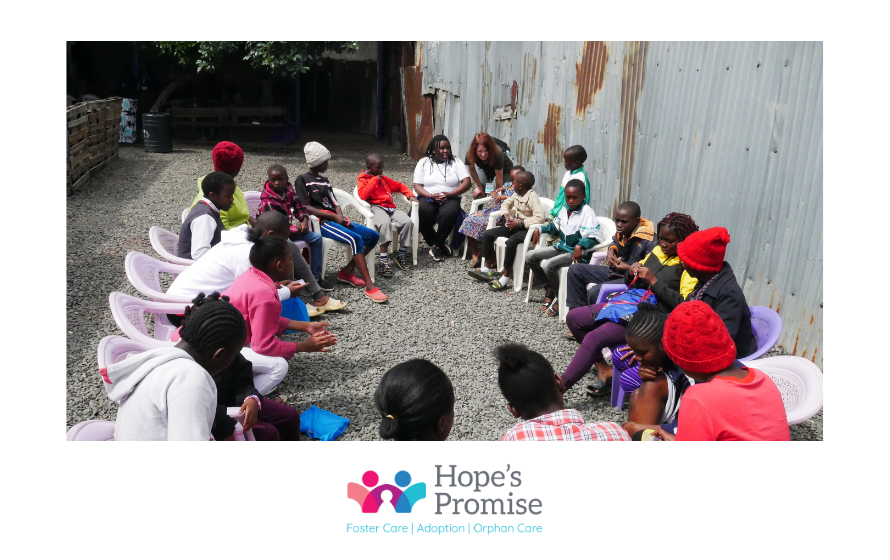Why We Discontinued Child Sponsorship
by Colleen Briggs, Hope’s Promise, Director of Orphan Care
Child sponsorship is a well-known fundraising model in the realm of international childcare programs. We opened our oldest existing program in Kenya in 2006 through funding generated by child sponsorship.
On the plus side, donors connected to a child’s story and felt personally invested in the child’s wellbeing. Theoretically, the child would be encouraged and uplifted by having a “friend” on the other side of the world who prayed for and invested in their life. And the sponsor would be impacted by learning about the way of life in the child’s country.
But through the years, we stumbled experientially into unintended consequences of child sponsorship for the orphaned children we serve.
For these kids, who have lost the most important attachment in their lives when one or both parents died, their most important task for long term holistic wellbeing is to experience God’s love through attachment to a new caregiver and not to a stranger on the other side of the world.
We began to experience the complications of a funding model that conflicted with program goals when some of our Kenyan kids reached their early teens in Kenya and told their parents, “I don’t have to listen to you because I have a sponsor in the US. “
A particularly poignant experience brought the dissonance to the forefront in 2019 when a Connection Trip team from the US visited a Hope’s Promise family in Vietnam. We took backpacks for each child we planned to visit, filled with standardized items we’d collected from multiple sponsors. Following our direction, a child sponsor on the team presented a backpack to her sponsored child. When the little girl climbed on the sponsor’s lap to open the bag, the nonverbals of her parents needed no translation. Their expressions held a mixture of happiness for the child’s excitement, but also a wistfulness and sadness. We realized in that moment how strange it would, as a parent, if a stranger who had financial influence over my child brought gifts I could not afford.
That was the tipping point. We immediately switched tactics. For the rest of the trip, we gave the kids’ backpacks to the parents privately to distribute later, if and when they wanted. We shared photos of the backpacks and the families with our sponsors, but not photos of the children with the gifts.
Then, in 2020, with Phil Aspegren’s input, we took the plunge and switched funding models completely. A quote from him became our guiding principle: “sell your impact, not your kids.” We decided it was time to fully acknowledge and course correct the incongruence in our funding model and program goals.
We undertook a year-long process, contacting over one hundred child sponsors directly and personally through email and phone call. We described why we were changing models and invited their input. We amended how we described our new funding model several times based on their feedback. However, they expressed unanimous support for the heart of the changes.
We still collect reports on each child in our program, because it’s just good social work. But, instead of “child updates,” we now share “impact reports” with our donors, including stories we’ve selected that protect dignity and privacy and celebrate potential.
Here is how we describe our new model on our website:
Child Sponsorship Reimagined
Traditionally, child sponsorship cultivates a relationship between a child in need and a benevolent stranger in another country. However, global orphan care research reveals that when a child loses one or both parents, what they need most is God’s love expressed through a new caregiver and family. Sometimes a relationship with someone far away, especially someone who is known to support them financially, can distract a child from learning to trust and attach to their family.
So, imagine with us a new kind of “child sponsorship,” designed specifically for the needs of an orphaned child’s heart. Imagine an investment that stays behind the scenes, invisible to the child but nonetheless essential to the family’s success. Imagine a new way of supporting a child by shining the spotlight on his or her family.
Although Hope’s Promise children may never know your name, when you become a family champion, you become a catalyst for transformation in their lives.
Learn More About Becoming a Family Champion.
We are so thankful we switched because we now believe our fundraising and program goals are congruent – doing what is best for orphaned children, supporting their attachment to their caregivers so they have the best chance of experiencing God’s love in those relationships.

